Men's Health Q&A with Miguel Blas-Matus, PA-C
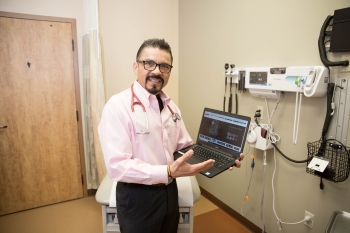
We sat down with one of CBHA’s long-time providers, Physician Assistant - Certified (PA-C) Miguel Blas-Matus, to talk about the health issues he sees most often in male patients.
Blas-Matus believes in the holistic approach to medicine – that a person’s well-being is more than just their physical health. It includes mental and emotional health as well. This holistic, TotalYou approach, is evident in the way he treats patients, and aligns with CBHA’s philosophy of caring for the whole person.
What do you see as being the biggest obstacle to overcome for men to receive optimal healthcare?
Miguel Blas-Matus: Well, first, men need to get to the clinic. They need to be seen by their provider – once a year, at least – for a complete physical. That would include having blood work, having blood pressure checked, and a prostate exam. But men as a group historically don’t see their provider until something is really wrong, or they’ve been feeling poorly for quite a while. We all need to listen to our bodies more. Our body will often tell us when it’s really not well. And if you’re seen earlier, many conditions can be treated successfully, more easily and more completely, than if you avoid the doctor until you’re really sick.
What’s the greatest health threat you see facing men in your practice?
Miguel Blas-Matus: Hypertension. High blood pressure - without a doubt. It’s a silent killer. In fact, it’s the #1 killer of men in America, often leading to coronary artery disease, heart attack, or stroke.
Men sometimes think that high blood pressure only happens if they have a high pressure job or they’re over 65. That’s just not true. High blood pressure is common in men, even under the age of 45. Risk factors for cardiovascular disease include cholesterol, and smoking habits as well. We can calculate risk when we have the full picture, including these numbers.
What is Coronary Artery Disease?
Miguel Blas-Matus: Coronary artery disease is the narrowing or blockage of the coronary arteries, usually caused by atherosclerosis. Atherosclerosis (clogging of arteries) is the buildup of cholesterol and fatty deposits (plaque) on the inner walls of the arteries.
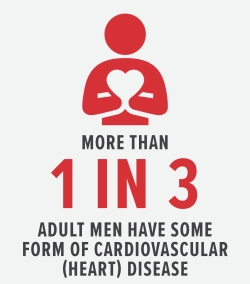
Coronary artery disease can lead to:
• Chest pain (angina) When your coronary arteries narrow, your heart may not receive enough blood when your body needs it, like during physical activity. This can cause chest pain (angina) or shortness of breath.
• Heart attack If cholesterol plaque ruptures and a blood clot forms, complete blockage of your artery may trigger a heart attack. The lack of blood flow to your heart may damage your heart muscle. The amount of damage depends in part on how quickly you receive treatment.
• Heart failure If some areas of your heart are chronically deprived of oxygen and nutrients because of reduced blood flow, or if your heart has been damaged by a heart attack, your heart may become too weak to pump enough blood to meet your body's needs. This condition is known as heart failure.
• Abnormal heart rhythm (arrhythmia) Inadequate blood supply to the heart or damage to heart tissue can interfere with your heart's electrical impulses, causing abnormal heart rhythms.
The same lifestyle habits that treat coronary artery disease can also help prevent it from developing in the first place. Improve your heart health by:
• Stopping smoking
• Monitoring your numbers: blood pressure, cholesterol, and blood sugar
• Staying physically active
• Eating a diet with more fruits, vegetables and whole grains, limiting salt and unhealthy fats
• Maintaining a healthy weight
• Reducing and managing stress
What is an important check-up or screening that’s often overlooked?
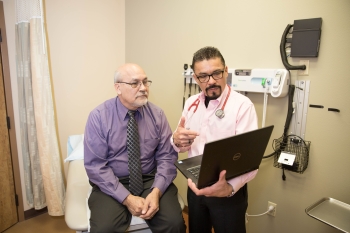
Miguel Blas-Matus: Many are surprised to learn that yearly eye exams are an easy and important way to protect your eyes and overall health.
A routine eye exam can help detect signs of serious health conditions, like diabetes, high cholesterol, or even a brain tumor. Since symptoms of health conditions often don't appear until damage has already occurred, eye exams are a great way to learn what's happening in your body.
Your eyes are the only place in your body that provide a clear view of your blood vessels, arteries, and a cranial nerve, which can tell us a lot about your overall health.
What kinds of screenings should happen regularly after a certain age?
Miguel Blas-Matus: We recommend a colonoscopy starting at age 50, or before that if there’s a family history of colorectal cancer. When colorectal cancer is found at an early stage before it has spread, the 5-year relative survival rate is about 90%. But only about 4 out of 10 colorectal cancers are found at this early stage. When cancer has spread outside the colon or rectum, survival rates are lower. Regular testing can save lives, and is covered by most insurance plans.
It’s also a good idea to have your blood sugar checked regularly, to be aware of prediabetic conditions.
The American Diabetes Association (ADA) celebrates today’s “modern man” as someone who is more aware of his blood sugar health. The ADA recommends that men “get out, get active, and get informed.”
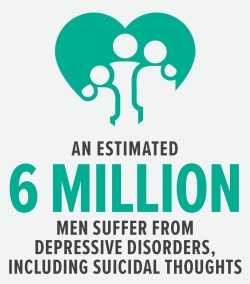 How often do you see diabetes is your patients?
How often do you see diabetes is your patients?
Miguel Blas-Matus: I see it a lot, unfortunately. Nearly one in ten people in the United States has Type 2 diabetes, with another three in ten having pre-diabetes, which means that if it’s not treated and reversed, it will advance to diabetes, usually within five years. I’ve also diagnosed many young people with Type 2 diabetes – both male and female, adolescent age, not just adult.
Type 1 diabetes is much less common, affecting only 5-10 percent of people with diabetes. And there’s nothing that can be done about Type 1 diabetes as far as prevention or cure.
But you can treat and prevent type 2 diabetes with a healthy diet, sufficient exercise, and not smoking.
If left untreated, diabetes can lead to nerve and kidney damage, heart disease and stroke, and even vision problems or blindness. Men with diabetes face a risk of lower testosterone levels and sexual impotence. This can lead to increased depression or anxiety.
Speaking of depression and anxiety, is this common for men?
Miguel Blas-Matus: Yes. We see a fair number of men with anxiety or depression – at all ages, from adolescent through senior age. Sometimes they come in for frequent headaches or digestive issues, and when we find there’s no biological explanation for these symptoms, it’s often revealed that there’s a lot of stress at home, or on the job, or the person is losing sleep.
Our mental health has a great impact on physical health. And the reverse is also true: physical health can have an impact on mental health. Being in chronic pain can lead to depression just as depression can lead to physical pain. The body is very connected.
Some ways to combat stress include:
• Getting regular exercise, even just going for routine walks around your neighborhood
• Journaling or writing down your thoughts
• Communicating openly with friends and family
• Seeking professional help
What’s something men can do today to see improvements in their health
and the way they feel?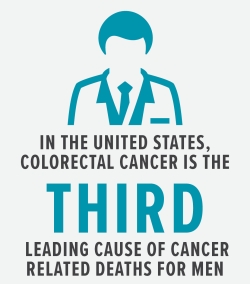
Miguel Blas-Matus: I have a lot of thoughts on this! Here are a few simple things that have a big impact:
First – get more sleep! Sleep deprivation is a big problem in our society. Everyone, not just men – needs at least seven hours of sleep. This can help heal many of our issues, including depression and anxiety. Sleep deprivation can contribute to chronic conditions. I think we spend too much time working and not enough time sleeping. So, a balance is needed for the best health.
Next – Get more fruits and vegetable and eat less of the foods like potato chips and other processed foods. Doing this will help manage high cholesterol and reduce the probability of getting Type 2 diabetes.
Also – Watch your alcohol consumption. Drinking alcohol everyday increases the risk of type 2 diabetes. It also increases your risk for cancer of the mouth, throat, esophagus, liver and colon. Men binge drink twice as much as women, and that leads to alcohol-related deaths and hospitalizations, which men have at higher rates than women.
 Finally, as a provider for 29 years and an athlete for 50 years, I’m
a big believer in the power of exercise. Research shows that an hour a
day of exercise five days a week greatly improves overall health. Your
heart is healthier. Your weight is managed. And you get a release of endorphins
that act as a natural anti-depressant. Exercise is a natural energy stimulant,
so you just feel better when you’re exercising regularly. My drug
of choice is exercise. I exercise an hour a day several days a week. It
keeps me healthy and gives me great energy. I highly recommend it.
Finally, as a provider for 29 years and an athlete for 50 years, I’m
a big believer in the power of exercise. Research shows that an hour a
day of exercise five days a week greatly improves overall health. Your
heart is healthier. Your weight is managed. And you get a release of endorphins
that act as a natural anti-depressant. Exercise is a natural energy stimulant,
so you just feel better when you’re exercising regularly. My drug
of choice is exercise. I exercise an hour a day several days a week. It
keeps me healthy and gives me great energy. I highly recommend it.
If it’s been more than a year since you’ve had a physical, including bloodwork, it’s time to give CBHA a call at 509-488-5256. Know your numbers. Receive strategies to feel your best. You’re worth it…and your health depends on it.